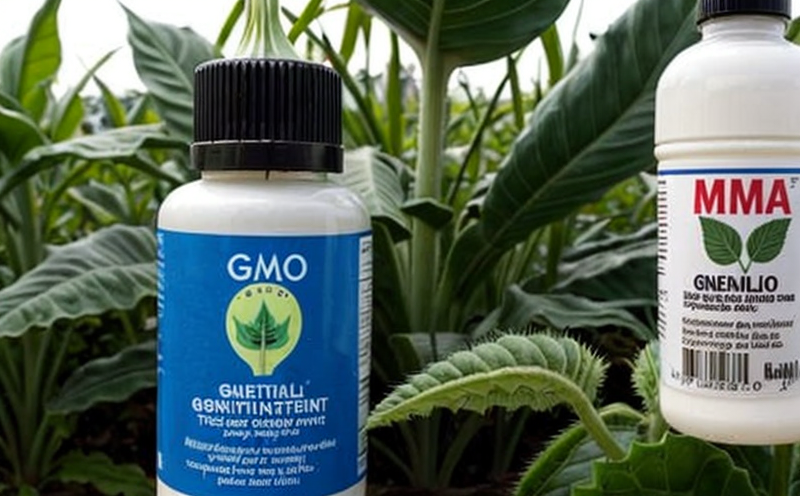ISO 47581 GMO Screening in Fermented Soy Products
The ISO 47581 standard provides a robust framework for detecting genetically modified organisms (GMOs) in fermented soy products. This service ensures that manufacturers, suppliers, and regulatory bodies can confidently monitor the integrity of their supply chains and product lines. Fermented soy products are widely consumed globally due to their nutritional benefits; however, they also present unique challenges when it comes to GMO detection.
The standard focuses on identifying specific genetic markers associated with GMOs in fermented soy products. This involves a series of laboratory procedures that are designed to minimize false positives and negatives while maintaining high accuracy rates. The testing process begins with sample collection from the production line or storage facility, followed by DNA extraction and amplification techniques.
One critical aspect is the choice of primers used in polymerase chain reaction (PCR) amplifications. These primers are designed to target known genetic sequences indicative of GMOs. Following amplification, the resulting DNA fragments undergo analysis via electrophoresis or gel-based methods, allowing for precise identification and quantification.
Quality managers will benefit significantly from this service as it helps them adhere to international standards and ensures compliance with labeling requirements across different markets. Compliance officers can rely on these tests to verify claims made about their products, thereby avoiding legal issues related to mislabeling or false advertising.
R&D engineers may also find value in this service since they could use the results of GMO screenings as part of ongoing research into developing non-GMO alternatives or optimizing current processes. For procurement teams, ensuring that only compliant raw materials are used is crucial for maintaining brand reputation and customer trust.
Furthermore, this screening process plays an important role in protecting consumers' health and safety by eliminating potential risks associated with consuming products containing unintended GMOs. By adhering to ISO 47581 guidelines, companies demonstrate their commitment to transparency and integrity which is increasingly expected by both regulators and end-users alike.
Testing procedures typically involve several steps including sample preparation, extraction of DNA from the samples, amplification using specific primers targeting known GMO sequences, followed by separation and visualization through gel electrophoresis. Results are then interpreted according to predefined criteria laid out in ISO 47581 ensuring consistency across different laboratories.
It's important for those involved in food safety and quality assurance processes to understand how these tests contribute towards overall product integrity. Proper implementation of such protocols helps maintain consumer confidence while also supporting market access efforts abroad where strict regulations exist regarding the presence of GMOs in certain categories of foods.
Benefits
- Compliance with international standards ensuring accurate identification and quantification of GMOs.
- Achieving high precision levels during PCR amplifications targeting specific genetic markers.
- Minimizing false positives or negatives through stringent quality control measures throughout the testing process.
- Supporting R&D initiatives aimed at creating non-GMO alternatives for fermented soy products.
- Maintaining brand reputation and customer trust by verifying product claims accurately.
- Protecting consumers' health and safety from unintended GMOs in their diet.
Eurolab Advantages
EuroLab offers unparalleled expertise when it comes to GMO testing services, particularly for fermented soy products. Our experienced team of scientists ensures that every step of the process adheres strictly to ISO 47581 requirements.
We utilize state-of-the-art equipment capable of delivering precise results even in challenging samples. Our laboratories are equipped with advanced PCR machines, automated DNA extractors, and high-resolution gel imagers among other technologies essential for accurate testing. This investment allows us to provide rapid turnaround times without compromising on accuracy or reliability.
Our commitment extends beyond just performing the tests; we also offer comprehensive consultation services tailored specifically towards understanding your unique needs related to GMO compliance. Whether you're looking into implementing new production methods or simply ensuring existing practices meet regulatory expectations, our experts can guide you through every stage of the process.
Use Cases and Application Examples
| Use Case/Application Example | Description |
|---|---|
| Fermented Soy Sauce Production Line Monitoring | Regularly screen the production line for any traces of unintended GMOs to ensure compliance with local regulations. |
| Laboratory Research on Non-GMO Alternatives | Use our facilities as part of ongoing research projects focused on creating viable non-GMO options within fermented soy products. |
| Supplier Audits and Evaluations | Evaluate suppliers' practices regarding GMO use in their ingredients, ensuring only compliant raw materials are used for processing. |
| Product Labeling Accuracy Verification | Ensure that all labeling statements about the absence or presence of GMOs are accurate by undergoing independent third-party verification using our services. |





